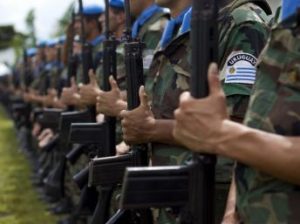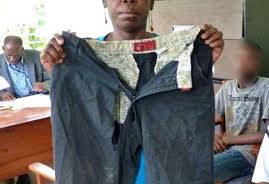
Uruguayan peacekeepers
Outcries over Uruguayan peacekeepers’ rape allegations of an 18-year-old Haitian man did not spark the country’s distrust and disgust of the United Nations Stabilization Mission in Haiti (MINUSTAH). Haitians have protested peacekeepers’ overwhelming presence in their homeland since they landed following the 2004 ousting of former President Jean Bertrand Aristide. Many people even demanded their immediate departure.
Absent potential genocides or imminent threats of civil war, it is nearly impossible to justify U.N.’s large presence in Haiti. Yet, 3,500 additional pairs of boots landed in the country following the Jan. 12 earthquake, totaling up to 12,000 soldiers. Amidst the most recent sex scandal, talks of a troop draw-down became pervasive: by 15 percent, according to Brazil’s Minister of Defense Celso Amorim.
CNN’s depiction of the leaked video follows:
“At the beginning of the video the alleged victim is slapped in the face. He screams several times while the alleged perpetrators laugh. The laughter grows louder as a seemingly naked man approaches the alleged victim from behind. The young man is subsequently released and the video ends. The video obtained by CNN does not show a sex act.”
Since the one-minute cell phone video infiltrated the Internet, the Uruguayan government engaged in a public relation campaign, a clever strategy designed to appease public anger aimed at his troops.
Many people wondered about such elaborate, decisive PR efforts for the accidental introduction of the Vibrio cholera strain to the Western Hemisphere, particularly in Haiti. The preventable and easily treatable disease killed 620 Haitians every month since discovered 10 months ago in October 2010, accumulating 6,200 bodies, sickening more than 400,000 people.
particularly in Haiti. The preventable and easily treatable disease killed 620 Haitians every month since discovered 10 months ago in October 2010, accumulating 6,200 bodies, sickening more than 400,000 people.
U.N.’s persisting denial of responsibility, disregarding several scientific studies attributing culpability to a Nepalese Contingent stationed in the Artibonite Department, angered Haitians who charged to the streets demanding apologies and reparations. Rather than admitting to any wrongdoing however, the United Nations maintained its confluence of circumstances theory, arguing that other factors contributed to the deadly cholera outbreak.
Culture insensitivity, abuse of authority and unresolved or unpunished sexual abuse cases fueled more Haitian anger, sending the relationship between peacekeepers and the population plunging. The declassified documents about the 2005 Cite Soleil Massacre is a prime example of peacekeepers’ faux pas that left a sour taste on Haitian tongues. Using the Freedom of Information Act, Assistant Professor of Geography at College DuPage Keith Yearman obtained MINUSTAH’s July 6, 2005 raid documents. The cables revealed that some 1,400 Brazilian and Jordanian peacekeepers expanded 22,000 rounds of munitions in search of gang leader Dread Wilme. The seven-hour firefight left many civilians dead, including innocent women and children.
The 2007 repatriation of 114 Sri Lankan soldiers for alleged sex crimes, including the rapes of children as young as seven years old, further eroded the tolerance of Haitians desperately trying to protect their young. “In 2007,” declared the Haitian Lawyers Leadership Network (HLLN), “it was discovered and reported that girls as young as 13 were having sex with U.N. peacekeepers for as little as $1 in Haiti.” In some cases, peacekeepers used candy to disguise rape as prostitution. Last year Polin Aleandre, a social worker that monitor child prostitution in Port-au-Prince, reported some girls between ages 9 and 13 received sexual advances from peacekeepers in front of the national palace.
While the Sri Lankan army Spokesperson Brigadier H. A. Nihal Hapuarachchi professed they prosecuted repatriated soldiers found guilty in Haiti’s sexual abuse case, HLLN maintained perpetrators went free, unpunished. Similar cases popped up in 2004, involving Brazilian soldiers, in 2005, 2008 in the city of Leogane among many others.
Beyond Haiti’s borders, a huge body of literature unveils a lengthy trail of evidence of a pervasive sexual violence culture with huge U.N. fingerprints all over it. “A string of sex scandals from Bosnia to the Democratic Republic of Congo to Haiti involving peacekeeping missions has forced the United Nations to change the way it handles accusations of trafficking, rape and related crimes,” wrote author and UN Bureau Chief Neil MacFarquhar for the New York Times. In his article, “Peacekeepers’ Sex Scandals Lingers, On Screen and Off,” MacFarquhar drew a parallel between the current developments and a tumultuous decade for the UN based on the controversial movie “The Whistleblower.” Based on real life experiences of Nebraska cop Kathryn Bolkovac serving as a peacekeeper in war-ravaged Bosnia, the 2010 drama reenacted Bolkovac’s outing of UN’s cover up of a sexual scandal. “But,” concluded MacFarquhar, “the issue still bedevils the institution.”

Mother holding the pants the Alleged victim wore during alleged rape
The reprehensible acts traumatized victims and parents, while actors enjoyed the personal protection of the following statement from the Deputy Spokesperson for the Secretary-General Ban Ki-moon:
“Under the procedures agreed between the UN and troop-contributing countries, it is now the responsibility of the government of Uruguay to conduct the investigation with the full support of the UN.”
According to the status of forces agreement (SOFA), host nations expand jurisdiction to foreign military personnel serving within their borders, shielding peacekeepers from any criminal investigations from local authorities.
Rather than relying on failing agreements with troop-contributing countries to implement its zero tolerance policy for sexual abuse, the United Nations must address the problem at its roots: recruiting. Countries with little or no judicial infrastructure in human rights practices should not join the peacekeeping force. Having predators rescuing preys has not been a winning strategy.
Moreover, male-dominated countries should be subjected to rigorous scrutiny and training before joining the force, should they meet criterion one. The UN must also take a long hard look at peacekeeping immunity agreement, the greatest facilitator of the violent acts that leave unfortunate families already devastated by disasters, reeling.
While The UN’s quick PR response to the Uruguayan peacekeeping rape scandal may have appeased some flames, the Haitian frame of reference, instrumental in assigning meaning to future events, still lurks anxiously beneath the surface. Since Tolerance for further peacekeeping mishaps is virtually nonexistent, actions deemed unfair by Haitians will conjure up these horrific memories and inevitably provoke more widespread outrage.